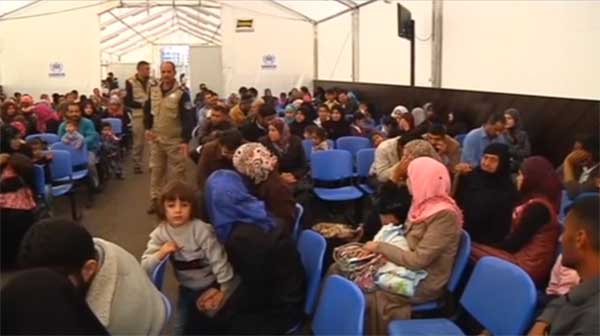It’s understandable that to most Australians who live a life free from war and persecution, the sheer scale of the world refugee crisis can feel overwhelming, and also distant. But there are concrete steps that our government can take to advance human rights at home and abroad.
Put simply, they can do this by including human rights in all their policies, instead of taking a shamefully inconsistent approach to refugees here and in the Asia Pacific region.
In particular, Australia’s treatment of asylum seekers offshore is cruel and inhumane, and has cost human life under our own watch.
Australia has shown in the past that it can be a human rights leader on refugees. It successfully resettled thousand of Vietnamese refugees in the 70s and 80s, many of whom have made a significant and long-lasting contribution to this country.
As a co-author of the UN resolution that passed earlier in the year to increase humanitarian aid to Syria – only the second UN resolution on Syria in a brutal three year conflict – Australia has demonstrated its commitment to global human rights.
It was also during Australia’s Presidency that UN Security Council members voted to allow chemical weapons inspectors into the country.
But at home, the great irony is that at a time when the numbers of people fleeing persecution are on the rise, Australia is spectacularly failing to lead by example when it comes to offering the very same Syrians it seeks to protect abroad, a safe haven in Australia.
Despite the huge need, with most of the 2.4 million people having fled to Lebanon, Jordan and Turkey, Australia has so far only offered to take 500 Syrian refugees from our existing humanitarian places.
The Swedish government announced in September last year it would be granting permanent residency to any Syrian refugee seeking asylum that's already fled to Sweden.
There are countries leading on this issue in ways Australia SHOULD be.
It is not beyond Australia’s reach to make a life-saving gesture like we have before. In 1989, as the harrowing footage from the Tiananmen Square massacre rolled in, Former Prime Minister Bob Hawke’s granted an asylum stay to 42,000 Chinese students, a move that ensured safety and protection for thousands of students who were at risk of persecution.
Sweden is now one of only two countries in the EU alongside Germany to be so welcoming to Syrians, and potentially save thousands of lives in the process.
It also means that approximately 8,000 Syrians who had previously received temporary residency permits will now be offered permanent residency. All refugees will also be granted the right to bring their families along with them.
Australia should consider taking a leaf out of Germany's book – a country which has offered 10,000 places (a whopping 80 per cent of the total pledges) for resettlement.

When other countries with less are offering to take more refugees from Syria, it is well within Australia’s capacity to increase its intake to at least 7,500 places – in addition to, not part of, our existing humanitarian quota of 13,500.
Forcibly transferring asylum seekers to another, much poorer country like Cambodia is an unlawful – and shameful – alternative that outsources our refugee responsibility.
The horrific killing of Iranian asylum seeker Reza Berati and injury to over 100 hundred other asylum seeker in February at the Australian-run Manus Island processing centre tragically highlighted the human cost of consecutive governments’ hardline and cruel approach to asylum seekers at home.
When we visited the centre in December, our researchers found daily human rights violations taking place.
Reza Berati’s death was shocking, but sadly not surprising, given what we found at the centre.
In our report, we explicitly warned that mounting frustration was inevitable beyond six months of indefinite detention.
We documented a host of daily human rights violations taking place including some asylum seekers being given only one-tenth of their recommended daily water.
The lack of processing, the indefinite nature of detention and appropriate health-care has also led to serious mental health issues.
So serious was the situation that one asylum seeker told us that he would rather die at sea.
In May, despite being denied access to revisit the centre alone, we were able to go as part of a PNG court inspection of the facility.
We wanted to see what had changed and how conditions had been improved, as promised by Immigration Minister Scott Morrison. We found conditions were still not better and had in some instances, worsened.
Sadly, Australia has not only spectacularly failed to protect and respect asylum seekers, many who have fled torture and persecution, but it has failed the ultimate duty of care – to protect the life of a young man.
Over the next few weeks I will be travelling firstly to Geneva to meet with UNHCR and governments to directly highlight the need for a greater commitment to Syrian refugees.
I will then travel to Jordan, heading back to the Za’atri refugee camp on the border with Syria.
When I visited this camp last year it already housed over 130,000 people, surviving in the middle of the desert. Sadly the vast majority will still be there.
As we mark World Refugee Week the call remains to close offshore detention centres and focus our efforts, not on punishing the most vulnerable people in the world, but working with other countries in the region to develop a regional solution that would save lives and ease the flow of refugees from conflict zones including Syria and Afghanistan.
* Dr Graham Thom is a refugee researcher with Amnesty International Australia
Donate To New Matilda
New Matilda is a small, independent media outlet. We survive through reader contributions, and never losing a lawsuit. If you got something from this article, giving something back helps us to continue speaking truth to power. Every little bit counts.



